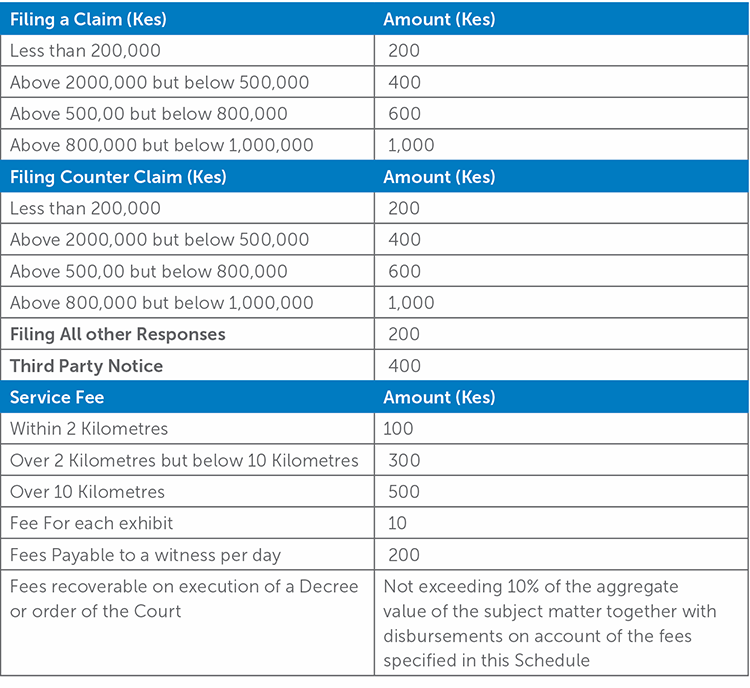Reprieve at last as Kenya’s Judiciary establishes a Small Claims Court
At a glance
- The Judiciary in Kenya has established a Small Claims Court to provide a simpler and more affordable forum for resolving disputes.
- The court has jurisdiction over civil claims related to contracts, torts, personal injuries, and set-off and counterclaims, with a value not exceeding Kes 1,000,000.
- The Small Claims Court has flexible procedures, can adopt alternative dispute resolution mechanisms, and aims to conclude matters within 60 days, promoting access to justice and ease of doing business.
Claims to be determined by the court
The Small Claims Court is established by the Small Claims Court Act 2 of 2016 (the Act). Section 12 of the Act provides that the court shall have jurisdiction to determine civil claims relating to:
- a contract for sale and supply of goods and services;
- a contract relating to money held and received;
- liability in tort in respect of loss of damage caused to any property or for the delivery or recovery of moveable property;
- compensation of for personal injuries; and
- set off and counterclaim under any contract.
The value of any claim to be entertained by the court shall not exceed Kenya Shillings One Million (Kes 1,000,000). Transfer of matters pending before other courts can only be done by a higher court.
Claims not to be entertained by the court
The Small Claims Court cannot entertain any claim for defamation, libel, slander, malicious prosecution, a dispute over a title to or possession of land, employment and criminal matters.
Flexible procedures
One of the unique aspects of the small claims court is that it is in full control of its procedures. The court is not tied down by the Civil Procedure Rules, 2010 or provisions of any other procedural law. The court may adopt a procedure that, in its opinion, would facilitate the objectives of the court and principles of natural justice. The court could also adopt Alternative Dispute Resolution Mechanisms (ADR) with the consent of the parties concerned. Further, the Act excludes strict application of the rules of evidence to proceedings in the court. Therefore, proceedings in this court could take a formal or informal approach as long as it is appropriate for the parties.
Timelines
Refreshingly, any matter filed before the Small Claims Court must be concluded within 60 days. This will greatly increase the ease of doing business in the country due to the speedy resolution of disputes. Further, the establishment of this court guarantees the right of access to justice as envisioned by Article 48 of the Constitution of Kenya.
Language of the court
This court does not have a particular language which is unlike the other courts in Kenya. Parties to a suit in this court could use English, Kiswahili, or any other appropriate language in the circumstances. This means that parties can choose to use a native language, Kenyan sign language, Braille, or any other language appropriate for persons with disability. This is a great step in making justice accessible to people who do not understand any other language other than their native languages.
Representation in court
Under section 20 of the Act, a party can appear in court in person or through a representative. The representative does not have to be an Advocate of the High Court of Kenya. The representative only needs to show that he / she has sufficient knowledge of the facts of the case and authority to bind the party he / she represents.
Affordable filing fees
To meet the objectives of the court, the filing fees are affordable. The fee breakdown is as follows:

Reliefs that the court may grant
The court may grant the following orders in a claim before it:
- an order to pay money as a lump sum or in instalments;
- an order for the restitution of moveable property;
- an order for recovery of money relating to performance of a contract;
- an order dismissing claims in proceedings before it; and
- any other consequential or ancillary order.
The first Small Claims Court was launched at Milimani Commercial Courts in Nairobi by the Ag. CJ Philomena Mbete Mwilu on 26 April 2021. The court is now operational and anyone with a claim falling within its jurisdiction can approach the court for reprieve.
The above alert is meant for general information and does not constitute legal advice. In case of any inquiries or if you require any further information or advice on how the Court could affect your business, please feel free to contact Desmond Odhiambo.
The information and material published on this website is provided for general purposes only and does not constitute legal advice. We make every effort to ensure that the content is updated regularly and to offer the most current and accurate information. Please consult one of our lawyers on any specific legal problem or matter. We accept no responsibility for any loss or damage, whether direct or consequential, which may arise from reliance on the information contained in these pages. Please refer to our full terms and conditions. Copyright © 2026 Cliffe Dekker Hofmeyr. All rights reserved. For permission to reproduce an article or publication, please contact us cliffedekkerhofmeyr@cdhlegal.com.
Subscribe
We support our clients’ strategic and operational needs by offering innovative, integrated and high quality thought leadership. To stay up to date on the latest legal developments that may potentially impact your business, subscribe to our alerts, seminar and webinar invitations.
Subscribe




